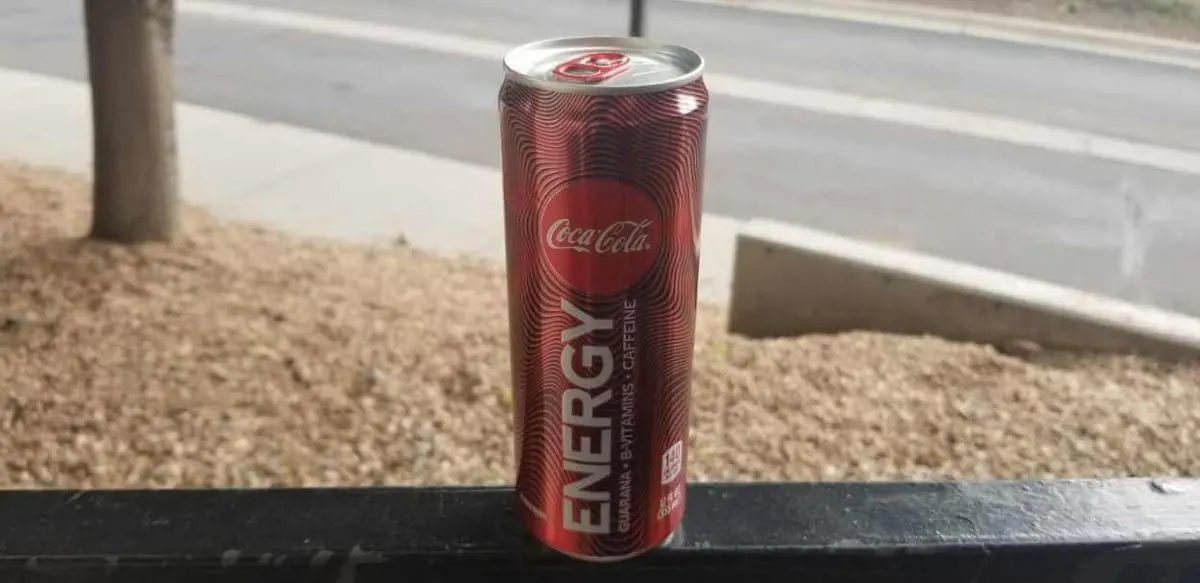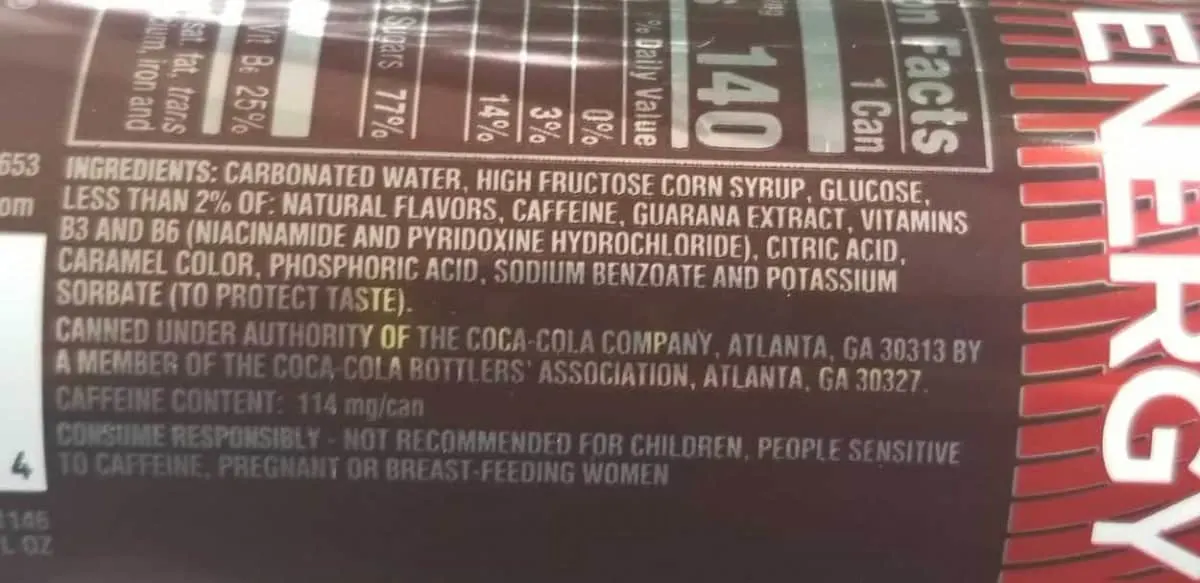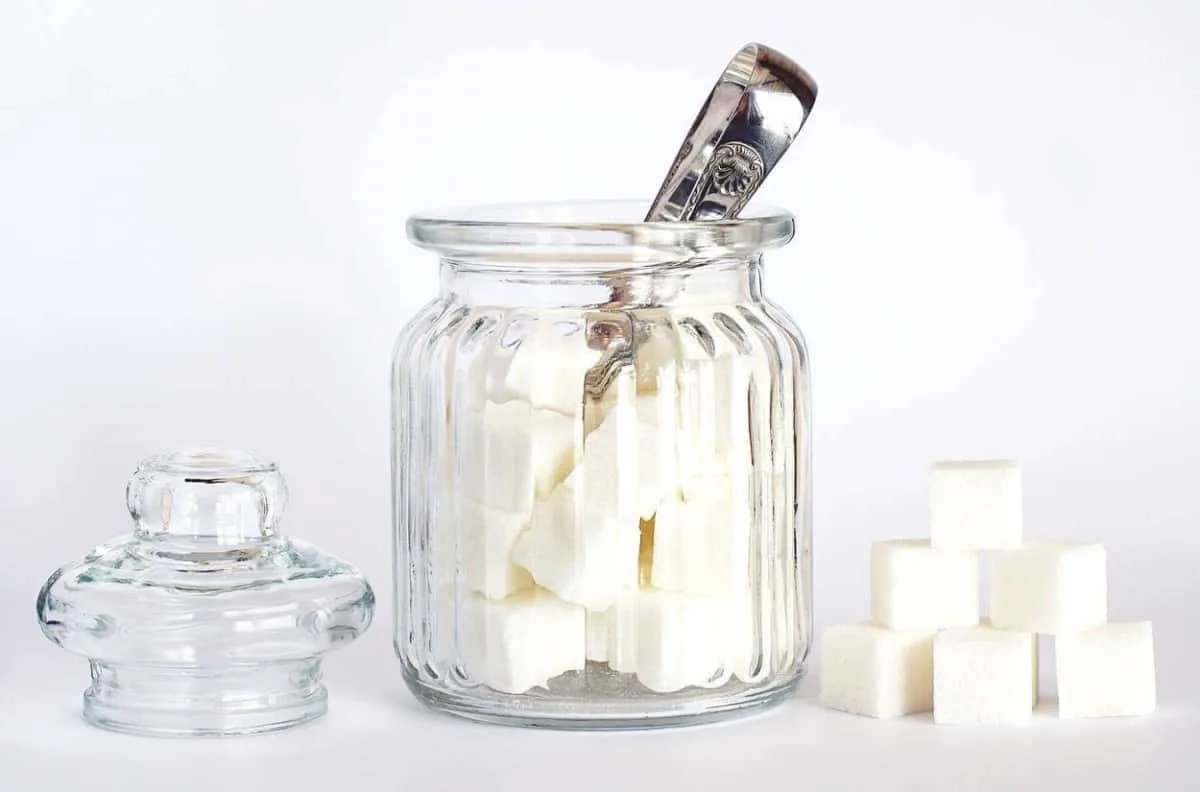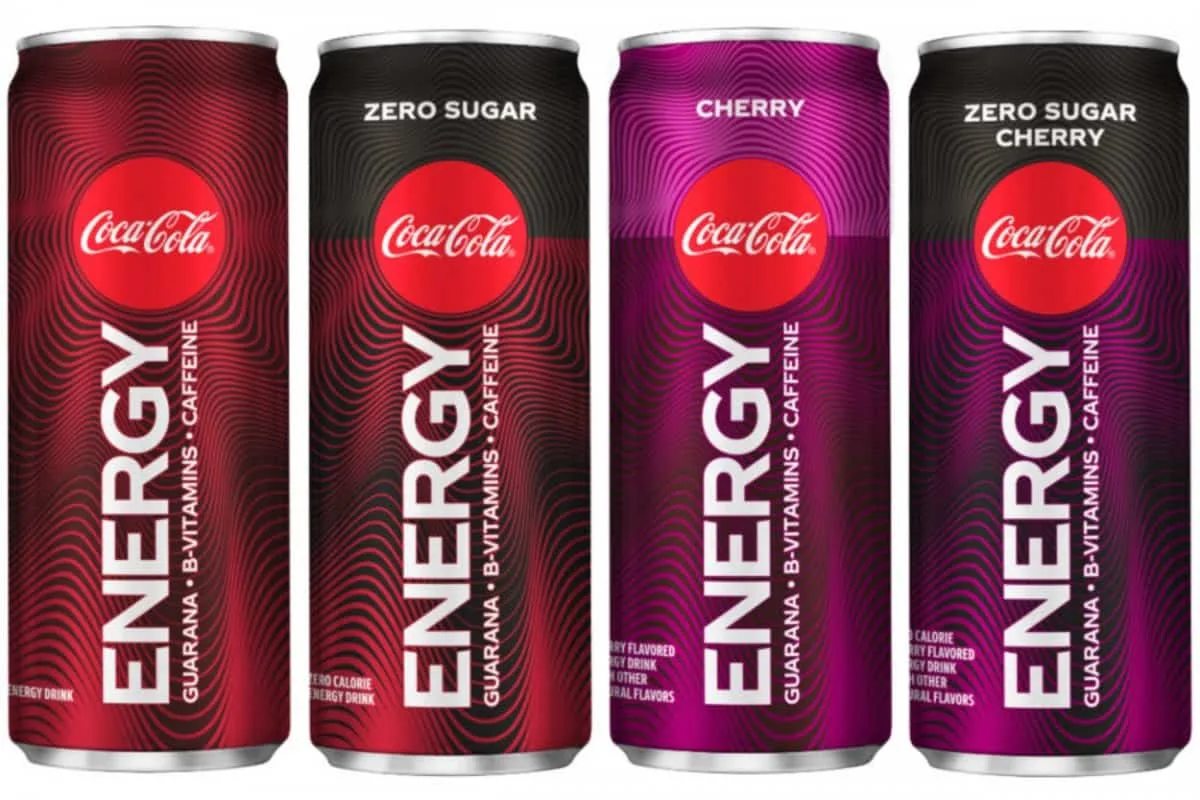
Coca-Cola energy drink is a product of the Coca-Cola company as their endeavor to step into the energy drink industry.
The drink was first launched in Hungary and Spain only. It comes in two flavors; Cherry and a sugar-free version.
In this article, I’m going to go on a deep analysis of the contents of a can of Coca Cola Energy Drink. What is it’s caffeine content? What are the ingredients used?
Stick around and find out.
Let’s get started…
Page Contents
Nutrition Facts of Coca-Cola Energy

Here’s a table showing all of the nutrition facts of Coca-Cola Energy:
| Standard Value Per Can | Coca-Cola Energy |
| Energy | 140 Calories |
| Caffeine | 80mg |
| Fat | 0g |
| Carbohydrates | 39g |
| Added Sugar | 39g |
| Protein | 0g |
| Sodium | 40mg |
Ingredients Of Coca-Cola Energy

This drink includes ingredients such as:
- Niacinamide (Vitamin B3)
- Pyridoxine Hydrochloride (Vitamin B6)
- Guarana Extract
- Citric Acid
- Phosphoric Acid (preservative)
- Sodium Benzoate (preservative)
- Potassium Sorbate (preservative)
- Carbonated water
- High Fructose Corn Syrup
- Glucose
- Caramel Color
- Natural Flavors
Coca-Cola Energy drink does not include Taurine in their mix which is unlike many energy drink of its class. Taurine when mixed with caffeine, helps to enhance performance both mentally and physically.
Caffeine Count of Coca-Cola Energy

In a 8.4 fl. oz can of Coca-Cola Energy there is a total of 80 mg of caffeine.
In my opinion, 80 mg of caffeine is not much as the FDA approved a daily caffeine limit of 400 mg per day.
But that doesn’t mean that you can consume too many cans of Coca-Cola Energy in a day. As too much caffeine can be harmful to your health.
Caffeine overdose can can cause severe health issues such as:
- Anxiety
- Dehydration
- Diarrhea
- Headaches
- Jitters
In fact, too much caffeine consumption could cause caffeine addiction.
It’s important to keep track of your daily caffeine intake when you’re drinking Coca-Cola Energy along with other sources of caffeine.
Children under 18 years old, pregnant or breastfeeding women should not drink any kind of energy drinks.
It’s advisable that if you have a low caffeine tolerance you should consult a health specialist to check how much caffeine is safe for you.
What is the main source of caffeine in Coca-Cola Energy?
Although there may be several sources, the main caffeine source of Coca-Cola Energy drink is Guarana.
Guarana is a Brazilian native plant that includes several stimulants and is rich in antioxidants. As per research, it helps improve focus and decrease tiredness.
How much caffeine does Coca-Cola Energy have compared to other popular brands?
Here is a table to show you the comparison between some of the most popular brands of energy drinks in the market against Coca-Cola Energy.
| Energy Drink | Caffeine Content (in mg) |
| Coca-Cola Energy | 80 |
| Bang | 300 |
| Monster Energy | 160 |
| NOS | 160 |
| Rockstar | 160 |
| Red Bull | 80 |
As you can see from the table, Coca-Cola Energy has a very low caffeine content compared to it’s rivals. This can be both a good thing or bad thing depending on how you view it.
It can be a bad thing for those who want a stronger caffeine kick from their energy drinks.
To me, the low caffeine content is a good thing as the risk of a caffeine overdose is much lower.
According to this research, the average caffeine content of a cup of coffee is somewhere between 50-100 mg. This means a can of Coca-Cola Energy is similar to having a cup of coffee, in regards to caffeine.
That’s the optimal level of caffeine that I personally think energy drinks should have.
Sugar Count of Coca-Cola Energy

Coca-Cola energy contains a total of 39 g of added sugar.
As per the AHA, the limit of maximum sugar intake per day is 36 g for men and 25 g for women.
This includes both natural sugar (found in fruit or milk) and added sugar (found in energy drinks or soda). In any case, a can of Coca-Cola Energy will surpass that limit.
Thus, it’s not advisable to have a can of Coca-Cola Energy daily as the sugar consumption could cause severe illnesses in the long run.
Risk of health issues include:
- Weight Gain
- Obesity
- Type II Diabetes
- Increased risk of heart disease
- Acne
- Increased risk of depression
When was Coca-Cola Energy made?
Coca-Cola Energy was first made in Europe in 2019 and later in the United States in 2020. The product was developed as a response to the growing demand for energy drinks and as an attempt to expand the Coca-Cola brand beyond its traditional soda offerings.
Coca-Cola Energy contains caffeine, guarana extract, and B vitamins, among other ingredients, and is marketed as a way to provide a quick and convenient energy boost. The product is available in both regular and zero sugar versions, which both are effective.
What is the energy in Coca-Cola Energy Drink?
The energy in Coca Cola Energy provides many benefits. Coca-Cola Energy Drink contains 114 mg of caffeine per 12 fl oz (355 ml) can, which is slightly less caffeine than a typical cup of coffee. Additionally, it contains guarana and B-vitamins, which are commonly found in energy drinks and supplements.
The exact amount of energy one can expect to receive from Coca-Cola Energy Drink may vary depending on individual factors such as weight, metabolism, and tolerance to caffeine. However, many people report feeling an increase in alertness and energy after consuming the drink.
Is Coca-Cola Energy Drink Bad For You?
Coca-Cola Energy can help you get a quick power recharge when you need it, as it doesn’t contain high caffeine or sugar count like many other energy drinks available in the market.
So I see no harm if you have it occasionally and responsibly. Having too many cans in a day might have drawbacks though.
How Many Cans Of Coca-Cola Energy Drink Can You Drink In A Day?
As I have already mentioned before, having multiple cans of Coca-Cola Energy is not advisable at all. Although the caffeine count in Coca-Cola Energy is still under the daily limit, the sugar content in the drink can be harmful in the long run.
I think you can have 3 to 4 cans of Coca-Cola Energy in a week. For the rest of the week try having tea or coffee when you’re in need of caffeine.
Are There Any Side Effects Of Coca-Cola Energy Drink?
Below is a list of minor side effects you might face consuming excess amounts of any energy drink.
- Weight gain
- Insomnia
- Nervousness
- Restlessness
- Shaking
- Irritability
- Fatigue
- Sugar Crashes
- Headaches
- Stomach Irritation
- Increased Heart Rate
However, if you aren’t responsible enough to consume caffeine and abuse the low caffeine count of Coca-Cola Energy you might face some major side effects too.
Some of the serious side effects are:
- Caffeine addiction
- Dehydration
- Poor dental health
- Kidney Stones
- High blood pressure
- Diabetes
But if consumed sensibly and in moderation, I think Coca-Cola Energy will not be harmful to your health.
Where Can You Buy Coca-Cola Energy Drink?
Initially being launched in Europe only, Coca-Cola Energy is now available in a lot of other countries too. You should be able to find it in your nearest stores where you can find other Coca-Cola products.
You can also try looking for it online on websites like Amazon. If you cannot find Coca-Cola Energy at your local retail stores, then online purchase is your best option.
Flavors of Coca-Cola Energy Drink
There are 4 flavors of Coca-Cola Energy drink, 2 of which are exclusive to USA only. The flavors are as below.
- Coca-Cola Energy Original
- Coca-Cola Energy Sugar-free
(USA variant)
- Coca-Cola Energy Cherry
- Coca-Cola Energy Cherry sugar-free

Price Of Coca-Cola Energy Drink
A can of 250 ml or 8.4 fl. oz of Coca-Cola energy drink would cost about $2.
However, the price may vary in different countries depending on flavor and size.
Is caffeine the main ingredient in energy drinks?
Caffeine is one of the main ingredients in energy drinks. These drinks also typically contain a combination of ingredients that aim to provide a boost of energy and enhance alertness. Energy drinks often contain ingredients such as sugar or artificial sweeteners, B-vitamins, taurine, herbal extracts, and other stimulants.
These ingredients work together to provide a temporary increase in energy and mental alertness.
Do all energy drinks have the same ingredients?
Not all energy drinks have the same ingredients. While caffeine is a common ingredient in most energy drinks, the specific combination and amounts of other ingredients can vary between brands and products.
Different energy drinks may contain varying levels of sugar or artificial sweeteners, B-vitamins, taurine, herbal extracts, amino acids, and other stimulants.
Where Is Coca-Cola Energy Drink Made?
Initially the drink was made in Romania, Europe when it was first launched.
But as the availability expanded to other countries it is most likely that the drink is to be produced locally rather than shipped from Europe.
Review of Coca-Cola Energy Drink
Taste
Although on the front side of the can it says “the only energy drink with a great Coca-Cola taste”, I didn’t think it was very similar to the iconic taste of Coca-Cola.
I personally felt that Coca-Cola energy is much less fizzy than the iconic Coke. Also, the taste seems a little dimmed considering it is supposed to be reminiscent of the classic version of Coke.
The sugar-free version of Coke and Coca-Cola Energy drinks are quite similar. However, the sugar-free version is slightly less fizzy and sweet compared to the sugary version of the energy drink.
Effect
Compared to other energy drinks in the market, Coca-Cola Energy is quite gentle in terms of power. It’s enough to keep you away from tiredness.
On the other hand, when I drank the sugar-free version it wasn’t as effective in terms of keeping me alert. On the bright side, I didn’t encounter any sugar crash and the effect lasted for about 2 hours.
I should also mention, with the regular sugary version of the drink I did experience a sugar crash. So, that is something you should keep in mind.
Other Alternatives Of Coca-Cola Energy Drink
Some alternative brands you could also try.
Ending Thoughts
From my experience and perspective, I would say that Coca-Cola Energy was overall good. Nothing too different as it didn’t fascinate me in terms of power. I personally liked the low caffeine, as it felt more natural to having a cup of coffee.
If you’re looking for a drink for the purpose of hydrating and giving you a quick jolt of energy, Coca-Cola Energy would be a good option to consider.
But if you’re seeking a strong energy drink, Coca-Cola Energy might not be it. In that regard look for other energy drinks available in the market.
